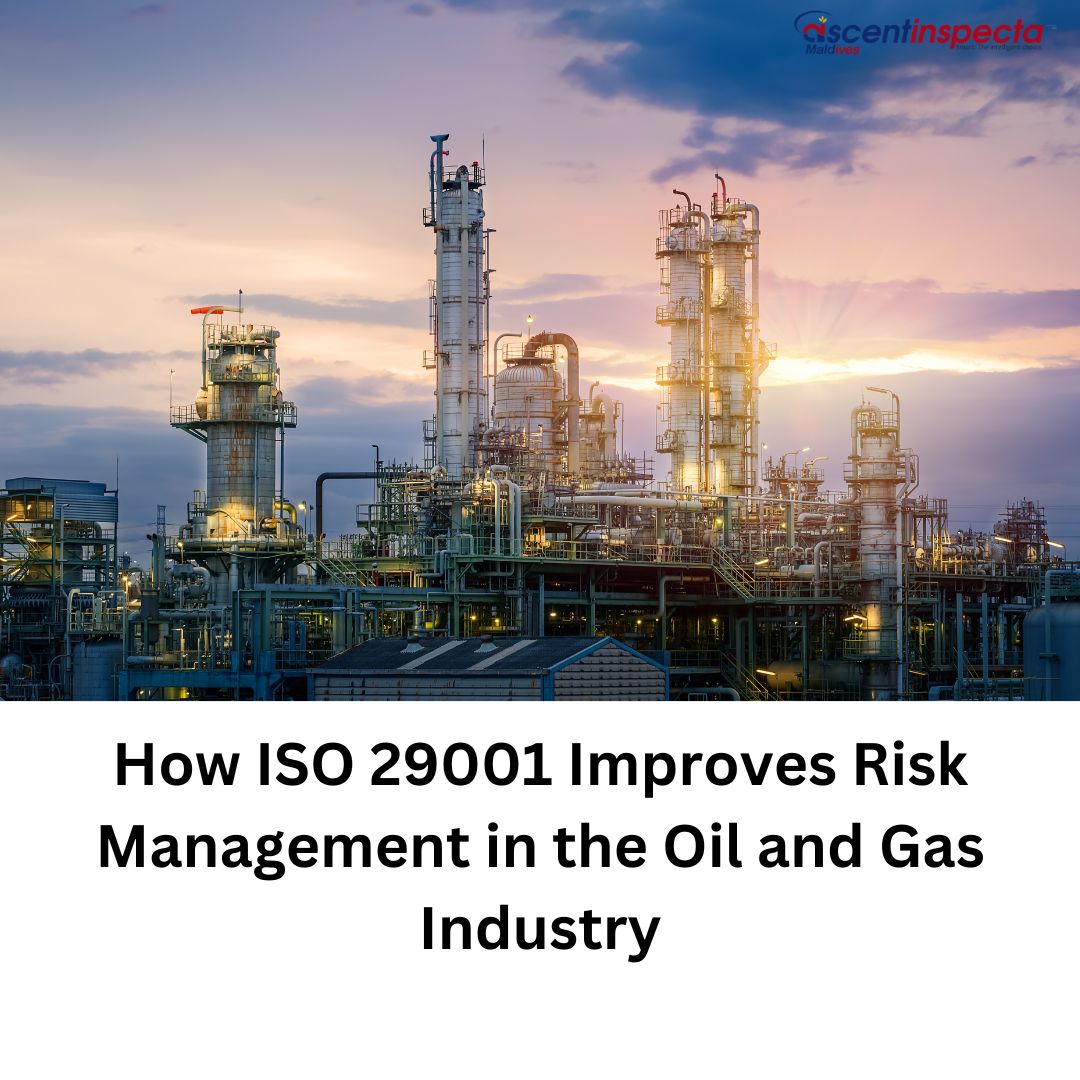Blog Details

Published: Sep 27, 2025
How ISO 29001 Improves Risk Management in the Oil and Gas Industry
The oil and gas industry operates in one of the most complex, high-risk, and tightly regulated environments in the world. From exploration and drilling to refining and distribution, every stage of the petroleum supply chain involves potential hazards—technical, environmental, financial, and operational. Managing these risks effectively is essential to maintain safety, ensure business continuity, and protect the environment. One of the most effective ways to strengthen this framework is through
ISO 29001 Certification, the global standard for quality management specifically designed for the petroleum, petrochemical, and natural gas sectors.
This standard not only enhances quality and reliability but also provides a robust structure for risk management, enabling companies to identify, assess, and mitigate potential threats before they escalate.
Understanding ISO 29001
ISO 29001 is an international standard developed jointly by the International Organization for Standardization (ISO) and the American Petroleum Institute (API). It is based on ISO 9001 (Quality Management System) but tailored specifically for the oil, gas, and petrochemical industries.
The core focus of ISO 29001 is defect prevention, operational consistency, and supply chain quality management. It helps organizations develop a quality management system (QMS) that aligns with the complex needs of the energy sector—where precision, safety, and efficiency are non-negotiable.
The Importance of Risk Management in the Oil and Gas Sector
The oil and gas industry faces unique and high-stakes risks such as:
- Operational hazards (equipment failure, explosions, or spills)
- Environmental threats (pollution, carbon emissions, waste management)
- Health and safety risks (accidents, exposure to harmful chemicals)
- Financial and reputational risks (regulatory non-compliance or supply disruptions)
Without proper control and mitigation strategies, these risks can lead to catastrophic losses—financial, environmental, and human. ISO 29001 introduces a structured approach to proactively manage and minimize these risks across every level of operation.
How ISO 29001 Improves Risk Management
1. Establishes a Structured Framework for Risk Identification
ISO 29001 requires organizations to adopt a systematic approach to identify potential risks throughout their operations. It emphasizes process mapping—examining every step of production, supply, and delivery to uncover vulnerabilities.
By continuously monitoring and analyzing data from production systems, equipment, and supply chains, organizations can detect patterns or irregularities that signal potential issues.
2. Promotes Preventive Action Over Reactive Response
Traditional risk management often focuses on responding to problems after they occur. ISO 29001 shifts this mindset toward preventive action by embedding risk-based thinking into every process.
For example, companies are encouraged to implement predictive maintenance programs based on performance indicators and quality metrics. This approach reduces downtime, enhances safety, and cuts repair costs.
3. Integrates Risk-Based Decision Making
ISO 29001 ensures that risk considerations are integrated into key decision-making processes. Whether it’s selecting a supplier, approving a new drilling site, or designing an engineering process, all decisions are guided by data-driven risk assessments.
4. Enhances Supply Chain Risk Management
The oil and gas industry relies heavily on complex, multi-tiered supply chains. ISO 29001 emphasizes supplier evaluation, qualification, and continuous monitoring to ensure consistent quality and reduce disruptions.
5. Improves Operational Control and Process Monitoring
ISO 29001 mandates detailed documentation and process monitoring mechanisms to ensure all activities—from drilling to refining—are performed consistently and safely. Continuous monitoring using KPIs and QCPs helps detect risks early.
6. Strengthens Emergency Preparedness and Response
The standard promotes proactive emergency preparedness by simulating incidents such as oil leaks, fires, or chemical spills—ensuring readiness, faster response, and minimal damage.
7. Encourages a Culture of Continuous Improvement
ISO 29001 embeds continuous improvement through regular audits, reviews, and performance monitoring—ensuring the company adapts to new technologies and regulations.
8. Facilitates Regulatory Compliance
The petroleum sector faces strict global regulations. ISO 29001 aligns with these frameworks, helping organizations maintain compliance, avoid penalties, and demonstrate best practices.
Benefits of ISO 29001 for Risk Management
- Reduced operational failures and unplanned shutdowns
- Improved health, safety, and environmental (HSE) performance
- Enhanced product and service consistency
- Greater customer confidence and satisfaction
- Better supplier performance and accountability
- Lower costs due to fewer errors and rework
- Increased resilience against market and operational disruptions
In essence, ISO 29001 transforms the organization’s approach from reactive risk control to proactive risk management—ensuring sustainability, efficiency, and profitability in the long term.
Steps to Achieve ISO 29001 Certification
- Gap Analysis: Evaluate your current management system to identify areas for improvement.
- Documentation: Develop procedures, policies, and manuals aligned with ISO 29001 requirements.
- Training: Educate employees about risk-based thinking and quality management principles.
- Implementation: Apply the system across all departments and processes.
- Internal Audit: Conduct internal reviews to ensure compliance and identify nonconformities.
- Management Review: Evaluate the effectiveness of the system and make necessary adjustments.
- Certification Audit: A third-party auditor verifies compliance before granting certification.
Why Choose Ascent Maldives for ISO 29001 Certification
Ascent Maldives is a trusted consultancy specializing in ISO certifications and management system implementation for the petroleum and energy sectors. With a team of experienced consultants and auditors, Ascent Maldives ensures a smooth, efficient, and result-driven certification process.
Here’s why organizations across the Maldives and beyond choose Ascent:
- Industry Expertise: Specialized knowledge in oil, gas, and petrochemical certification requirements.
- Customized Approach: Tailored solutions that align with your organization’s operations and goals.
- Comprehensive Support: End-to-end assistance from gap analysis to certification audit readiness.
- Cost-Effective Solutions: Affordable consultancy packages without compromising quality.
- Global Recognition: Assistance from qualified experts with international certification experience.
With Ascent Maldives, achieving ISO 29001 Certification becomes a strategic advantage—strengthening your risk management framework, ensuring regulatory compliance, and enhancing your company’s global credibility.
Comments Section
We’d love to hear your thoughts,Feel free to leave a comment below:
